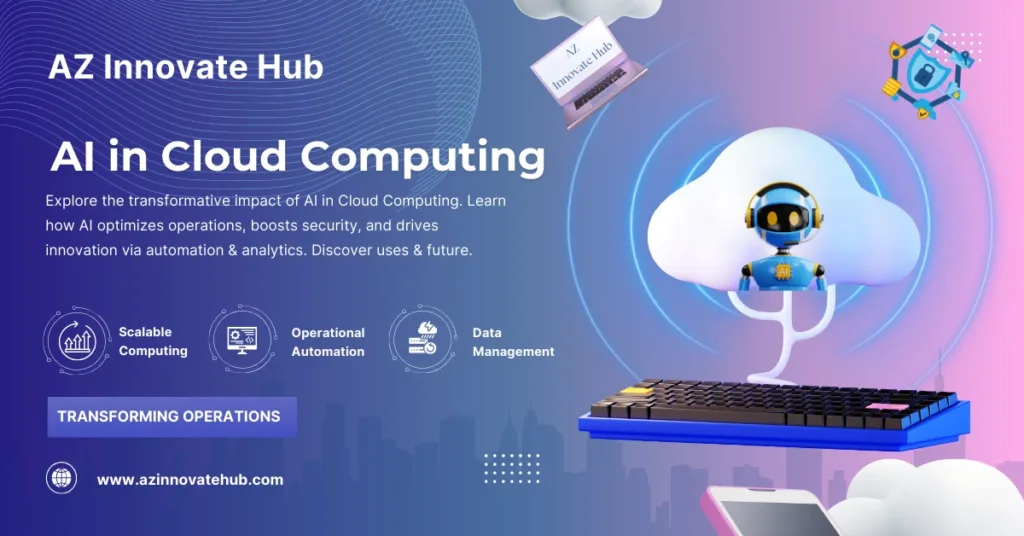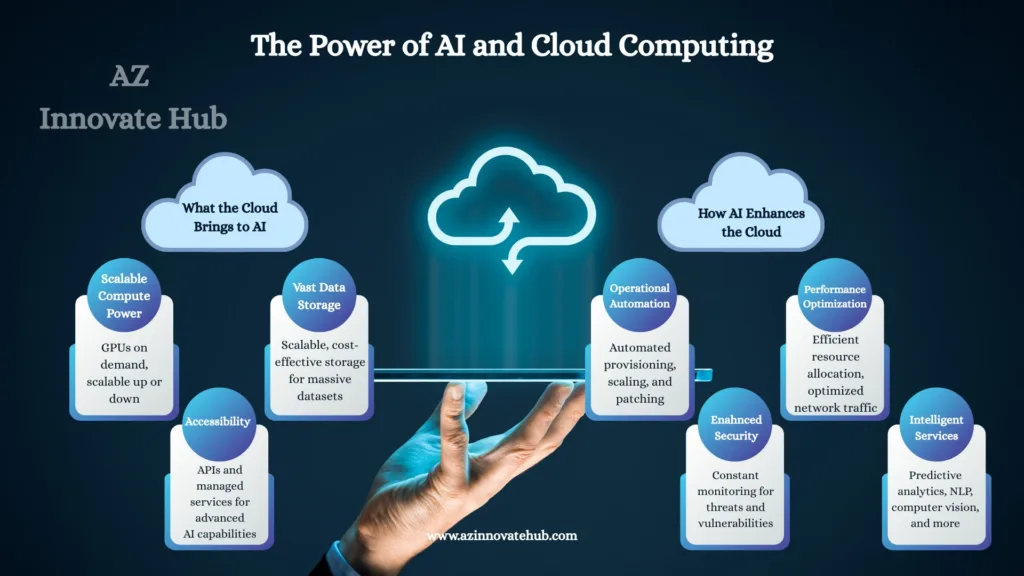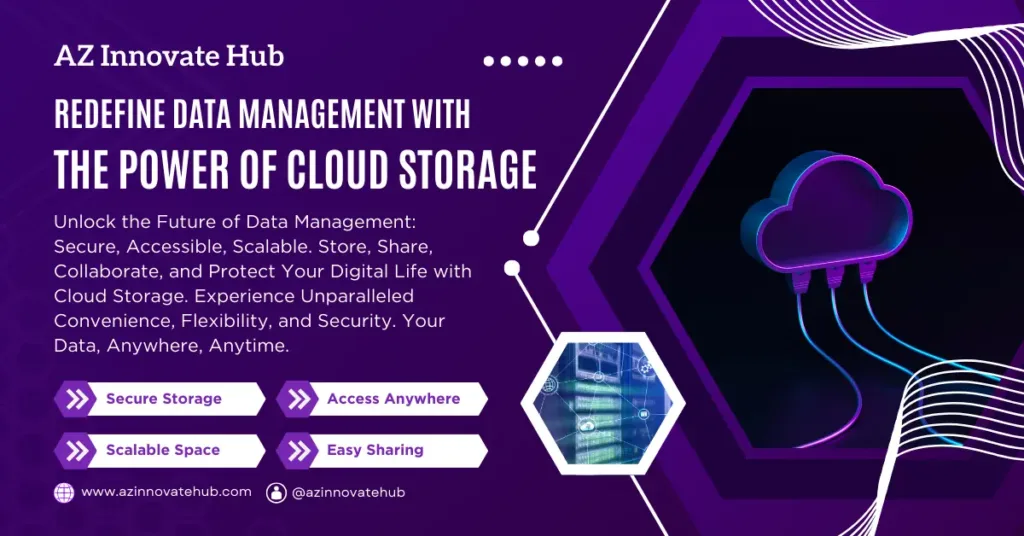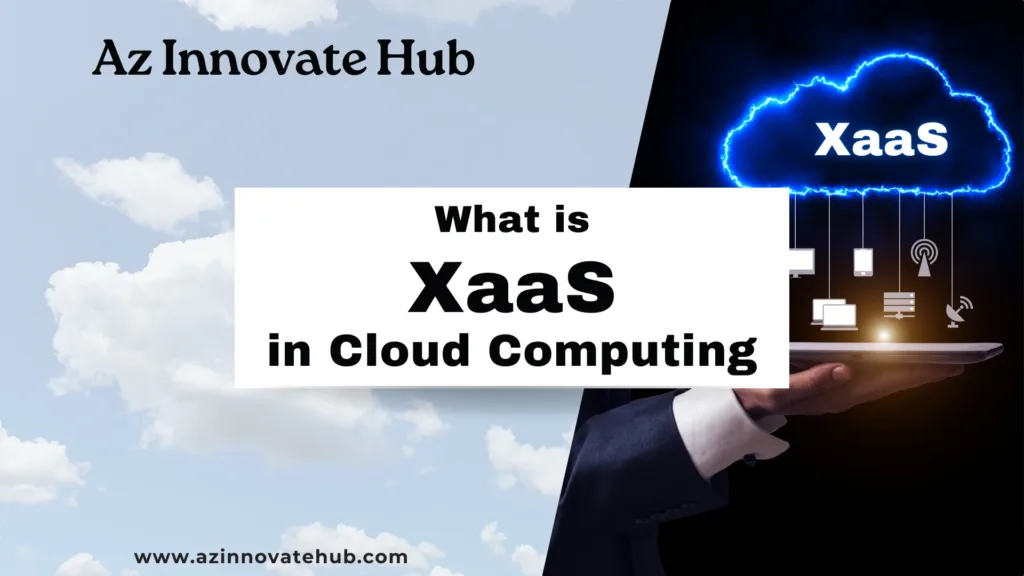
AI in Cloud Computing: Transforming Operations, Enhancing Security, and Driving Business Innovation in 2025
The future is here, and it’s powered by AI in Cloud Computing. But what does this look like in practice? in essence, there are two key ways this technology is making an impact: first, cloud providers are leveraging AI to make their hyperscale platforms possible through automation and intelligent management. Second, these providers are offering increasingly sophisticated AI-backed services directly to customers, enabling innovation at an unprecedented scale.
As AI and cloud computing continue to converge, the possibilities are endless. Imagine having the intelligence to optimize, automate, and secure your cloud environments, while also tapping into the scalable power and storage you need to drive innovation. For businesses looking to stay ahead in the digital landscape of 2025, embracing AI in Cloud Computing is no longer a nice-to-have; it’s a must-have for survival and growth. In this article, we’ll explore the benefits, applications, challenges, and future of this powerful combination.
Defining the Pillars: AI and Cloud Computing
Let’s start with the basics.
What exactly is Artificial Intelligence (AI)?
Simply put, AI refers to computer systems that can tackle tasks that typically require smarts humans; think speech recognition, image analysis, or even creating content. But AI isn’t a single technology; it’s an umbrella term that encompasses some pretty cool subfields:
- Machine Learning (ML): For instance, ML is all about training systems to learn from data and improve their performance without being explicitly programmed for every scenario.
- Deep Learning: A more advanced form of ML that uses neural networks inspired by the human brain to uncover complex patterns in large datasets. This technology powers some impressive applications including Large Language Models (LLMs).
- Generative AI: AI systems that can create new content such as text or images, code & videos based on user prompts.
What is Cloud Computing?
In simple terms, it’s a way for organization to access IT resources; like servers, storage, & software. Over the internet, without having to own and maintain the underlying infrastructure. Think of it like renting a house instead of buying one. You get to use the space without the long-term commitment and maintenance headaches. Cloud providers offer various services, including:
Cloud Service Models
- Infrastructure as a Service (IaaS): This model provides the building blocks of IT, like virtual machines, storage, and networks. You can manage the operating system, middleware, and applications.
- Platform as a Service (PaaS): PaaS offers a platform for developing, running, and managing applications without worrying about the underlying infrastructure. It’s perfect for developers who want to focus on building great apps.
- Software as a Service (SaaS): With SaaS, you get access to complete software applications over the internet, usually on a subscription basis (CRM, ERP, Email etc.). The provided handles all the infrastructure and software management, so you can just focus on using the application.
The Symbiotic Relationship: Why AI and Cloud Computing Are Inseparable
When AI and Cloud Computing join forces, the results is a game-changer, The cloud gives AI the perfect environment to thrive. Let’s break it down:
What the Cloud Bring to AI
- Scalable Compute Power: Training advanced AI models requires serious processing power, often in the form of GPUs. The cloud provides this power on demand, so organizations can scale up or down as needed without breaking the bank on hardware.
- Vast Data Storage: AI is all about data, and the cloud offers a scalable, cost-effective way to store and manage massive datasets. This means organizations can focus on building and training AI applications without worrying about running out of storage space.
- Accessibility: The cloud makes AI more accessible to businesses of all sizes. With APIs and managed services, organization can tap into advanced AI capabilities without needing a team of in-house experts.
But the benefits don’t stop there. AI also supercharges cloud platforms and services in some pretty significant ways:
How AI Enhances the Cloud
- Operational Automation: Managing modern data centers is a complex tasks, but AI helps streamline the process. By automating tasks like provisioning, scaling, and patching, AI automation reduces manual effort and minimizes errors.
- Performance Optimization: AI analyzes performance metrics to ensure resources are allocated efficiently, network traffic is optimized, and database queries are running smoothly. This means services run faster and more cost-effectively.
- Enhanced Security: AI acts as a watchful eye, constantly monitoring cloud environments for potential threats and vulnerabilities. This enables faster detection and response times, keeping data & applications safer.
- Intelligence Services: Cloud providers are now embedding AI into their services, offering features like predictive analytics, natural language processing, and computer vision. This means customers can tap into these advanced capabilities without having to build them from scratch.

Transforming Cloud Operations: Key Use Cases of AI
Putting AI to Work in Cloud Computing
The real value of AI in Cloud Computing lies in its practical applications. Let’s explore some key areas where businesses are seeing tangible benefits:
- Predictive Resource Management and cost Optimization: Imagine being able to predict your resource needs with accuracy. AI makes this possible by analyzing historical usage patterns, real-time demand, and performance metrics. This enables dynamic scaling, automatically adjusting compute power, storage, and network bandwidth to match demand. The result is significant cost savings and operational stability. Many cloud providers offer AI-powered auto-scaling features that can handle fluctuating workloads.
- Automated Cloud Management: AI can automate routine tasks like server health checks, configuration management, and security patches. This frees up IT personnel to focus on strategic initiatives and innovation. AI-driven monitoring tools can detect potential issues before they impact users and trigger automated remediation actions. Leading providers like AWS, Azure, and GCP are continuously enhancing their AI management and AI automation tools.
- Enhanced Security and Proactive Threat Detection: Security is top priority in the cloud. AI provides a powerful defense layer by analyzing vast amounts of data to identify subtle patterns indicative of threats. AI-powered security tools provide real-time alerts and can automate initial response actions, reducing the window of exposure and minimizing potential damage.
- Real-Time Data Processing and Advanced Analytics: AI enables the processing and analysis of vast amounts of cloud data in real-time, extracting valuable insights for faster decision-making. This supports business intelligence, customer insights, operational efficiency, and product performance. Platforms like BigQuery, Vertex AI, SageMaker, and Azure Machine Learning provide powerful tools for building and deploying ML models on cloud data.
Broader Business Benefits Driven by AI in Cloud Computing
The strategic integration of AI in Cloud Computing goes beyond operational improvements, delivering significant business value in several key areas:
- Boosting Productivity and Efficiency: By automating repetitive tasks, employees are freed up to focus on higher-value activities that require creativity and critical thinking. This means more time for innovation, strategy, and growth.
- Significant Cost Savings: AI-driven optimization, reduced manual intervention, and proactive threat prevention all contribute to significant cost savings. This means more resources for investing in business growth and innovation.
- Improved Scalability: With AI-powered cloud management, businesses can scale operations rapidly and cost-effectively in response to market demands. This means faster time-to-market, improved customer satisfaction, and increased competitiveness.
- Enhanced Personalization: AI analyzes customer data to deliver highly personalized experiences, product recommendations, and targeted marketing. This means increased engagement, loyalty, and ultimately, revenue growth.
- Accelerated Innovation: Cloud-based AI platforms and tools make it easier to experiment, develop, test and deploy AI-powered features and applications. This means faster innovation, improved time-to-market, and increased competitiveness.
- Better Data Management: AI helps organize, cleanse, secure and govern vast amounts of data stored in the cloud. This means improved data quality, compliance, and decision-making.
Leading Platforms & Tools
Major cloud providers are fiercely competing in the AI in Cloud Computing space, offering a rich ecosystem of services to support cloud operations:
- Amazon Web Services (AWS)
- Amazon SageMaker (ML platform)
- Bedrock (Generative AI)
- Rekognition (image/video analysis)
- Lex (Chatbots)
- Infrastructure AI automation tools for streamlined cloud operations
- Microsoft Azure
- Azure Machine Learning
- Azure OpenAI Service (access to advanced LLMs)
- Cognitive Services (pre-built APIs for vision, speech, language)
- Azure Sentinel (robust security tools for cloud operations)
- Google Cloud Platform (GCP)
- Vertex AI (unified ML platform)
- BigQuery (data analytics with built-in ML)
- Gemini models (Generative AI)
- Strong capabilities in data processing and AI infrastructure for optimized cloud operations.
Implementation Roadmap and Addressing Challenges
Merging AI with Cloud Computing can be a game-changer for businesses. But to make it work, you need a solid plan. Here’s what to do:
- Define Your Goals: Identify specific business problems or opportunities where AI can drive measurable value. This clarity will help you focus your efforts and ensure everyone is working towards the same objectives.
- Choose the Right Platform and Tools: Select cloud providers and tools that align with your needs, infrastructure, technical expertise, and budget. Consider factors like scalability, security, and integration with existing systems.
- Prepare Your Data: AI thrives on high-quality data. Ensure your data is clean, organized, accessible, and governed properly. Data integration from various sources is often crucial to unlocking AI’s full potential.
- Start Small and Iterate: Begin with a pilot project or a single, high-impact use case to gain experience and demonstrate value. This approach allows you to refine your strategy and scale up gradually.
- Monitor, Optimize, and Govern: Continuously track performance, refine models, manage costs, and ensure ethical and compliant use of AI. This ongoing process will help you maximize the benefits of AI while minimizing risks.
Challenge to Consider
While AI in Cloud Computing offers immense potential, organizations face several challenges:
- Data Privacy and Governance: Handling sensitive data in the cloud requires robust security measures and strict adherence to regulations.
- Integration Complexity: Integrating data from disparate systems can be technically challenging.
- Infrastructure Costs: Ongoing compute power costs can become significant if not managed carefully.
- Talent Gap: Finding and retaining personnel with expertise in cloud architecture and AI/data science remains a significant hurdle.
The Future Trajectory: What's Next for AI in Cloud Computing?
As AI and Cloud Computing continue to evolve, we can expect some exciting developments. Here are some key trends to watch:
- Smarter Automation: AI will take on more complex tasks in cloud infrastructure and application management, freeing up humans to focus on higher-level work.
- AI-as-a-Service (AIaaS): With AIaaS, businesses can tap into advanced AI capabilities via APIs, without needing a dedicated data science team. This will democratize access to AI and level the playing field.
- Generative AI Everywhere: Generative AI will become more widespread, powering features like AI-assisted coding, enhanced business intelligence, and more.
- Edge AI – Real Time Decision-Making: By combining cloud AI with edge computing, businesses can make faster, more informed decisions in areas like IoT, autonomous systems, and manufacturing.
- Responsible AI: A Growing Priority: As AI becomes more pervasive, we’ll see a greater emphasis on fairness, transparency, explainability, and ethics in AI development and deployment.
- Hyper-Personalization: AI will drive more tailored cloud services and application experiences, adapting to individual user needs and context.
Conclusion: Embracing the AI-Cloud Synergy
The Future is AI in Cloud Computing
The combination of AI and Cloud Computing is revolutionizing how businesses operate and make the most of their data. By leveraging the cloud’s scalability and AI’s intelligence, organizations can optimize, automate, and innovate like never before. From streamlining daily operations to enabling groundbreaking applications, the impact is significant.
Challenges Exist, But the Benefits are Clear
Of course, there are challenges to consider, such as data privacy, cost management, and finding the right talent. However, the benefits of AI in Cloud Computing far outweigh the drawbacks. With cloud providers like AWS, Azure, and GCP continually evolving their AI offerings, powerful tools are becoming more accessible.
Stay Ahead of the Curve
In today’s competitive landscape, embracing AI in Cloud Computing is no longer a nice-to-have – it’s a must-have for businesses that want to thrive. By harnessing the power of AI and the cloud, organizations can unlock new levels of efficiency, build resilience, and drive sustainable growth.





Pingback: AI in Data Centers: Revolutionizing Energy Management for Sustainable Cloud Computing - AZ Innovate Hub
Pingback: Internet of Things Networks 2025: Revolutionizing Connectivity - AZ Innovate Hub
Pingback: What is AIoT? How AI and IoT Power Cloud Computing - AZ Innovate Hub
Pingback: Top AI Cloud Platforms: AWS, Azure, and Google Cloud Compared - AZ Innovate Hub